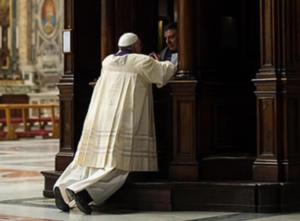Today’s epistle reading features I Corinthians 13:1-13. Here St. Paul achieves a sublimity and spiritual illumination so excellent that still encourages and enlivens. This passage surely appears in some odd settings: I’ve heard it read atop Maine’s Mount Agamenticus at a wedding that featured canine wedding attendants, and at Fulton, Missouri’s “Westminster Chapel” (where Winston Churchill coined the phrase “Iron Curtain” in 1946) at a Star Wars-themed wedding. I Corinthians 13 makes these crazy-train stops because St. Paul’s scriptural language on divine love has become the foundation for our secular, cultural language. Theologians rightly decry inculturation run amok, wherein cultural values infiltrate and overwhelm the Gospel’s primacy. The cultural popularity of one chapter—roughly two hundred fifty words translated into English—from St. Paul points to another problem: the dilution of the Gospel beyond the point of recognition.
These problems stem in part from St. Paul’s own words. This particular segment
Love is patient, love is kind.
It is not jealous, it is not pompous,
It is not inflated, it is not rude,
it does not seek its own interests,
it is not quick-tempered, it does not brood over injury,
it does not rejoice over wrongdoing
but rejoices with the truth.
It bears all things, believes all things,
hopes all things, endures all things.
Love never fails.
These are precisely the words that wedding plans—Christian and secular alike—adore. What could be nicer? For starters, it helps to remember that St. Paul describes here God’s love (with clear implications for understanding the Trinity) from which our loves— spiritual and physical—take their form and vibrancy. Love without God is bound to fail; only with God’ love—which we experience as grace—do we hope and endure all things. Supporting, enlightening, and justifying this great spiritual reality that is divine love stands the eschaton. There will come a day when we realize fully and completely the truths by which we live now only dimly and partially seen.
spiritual and physical—take their form and vibrancy. Love without God is bound to fail; only with God’ love—which we experience as grace—do we hope and endure all things. Supporting, enlightening, and justifying this great spiritual reality that is divine love stands the eschaton. There will come a day when we realize fully and completely the truths by which we live now only dimly and partially seen.
At present we see indistinctly, as in a mirror,
but then face to face.
At present I know partially;
then I shall know fully, as I am fully known.
So faith, hope, love remain, these three;
but the greatest of these is love.
Amen indeed—love is the greatest. We will know this love fully some day, but meanwhile how do we live now? The eschaton brings to fulfillment the kingdom of God which Christ proclaimed. From last week’s Gospel (Luke 4), Jesus reads Isaiah’s proclamation of good tidings to captives, the poor, and the afflicted, then sits down announcing “Today this has been fulfilled in your hearing.” In other words, like St. Paul writes to the Corinthians, the Kingdom already exists here on earth.
Constructing the path to this “already, but not yet fully” is St. Paul’s “still more excellent way.” God’s love, which the Holy Spirit brings us, enlivens our lives and interactions with each other. Any kingdom, and certainly God’s kingdom, necessarily rests on communitarian foundations. So, the more excellent way—an ethic, and the eventual route to God’s Kingdom—necessarily go through and with the Church. In this we benefit from, as St. Paul said, “a great cloud of witnesses” (Hebrews 12:1). Father Michael Sliney, LC, cultivates a burgeoning YouTube and Google+ parish, each post declaring “Thy Kingdom Come!” Anthony Esolen has written recently a delightful book Reclaiming Catholic Social Teaching. Using an impressive grasp of Pope Leo XIII’s encyclicals, Esolen reasserts the Church’s social message for family, Church, and state. The relationship with God bonds the individual to each of these communities in specific ways. The key, of course, is to make sure one’s loves are ordered properly. This happens only with God’s love. Finally, today is the feast day of St. John Bosco, who pursued the “still more excellent way” with working-class boys in mid-nineteenth century Turin, Italy. It was not easy work, but St. John persevered. A dream at age nine had convinced him God had called him to the vocation. In the dream John fought a gang of boys, but then a man intervened, calling John to become their leader. When John protested, the man insisted humility and cheerfulness would win them over. St. John’s dream, in other words, reaffirmed St. Paul’s “still more excellent way.” The providential intersection of St. Paul’s epistle and the feast of Catholic youth ministry’s great patron should illuminate our own relationships with God and, through God, with others.
Guest blogger Jeffrey Marlett blogs at Spiritual Diabetes.


